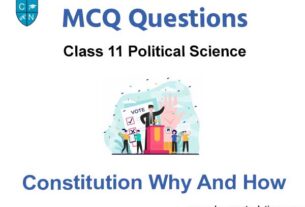Check the below NCERT MCQ Class 11 Political Science Chapter 3 Election and Representation with Answers available with PDF free download. MCQ Questions for Class 11 Political Science with Answers were prepared based on the latest syllabus and examination pattern issued by CBSE, NCERT and KVS. Our teachers have provided below Election and Representation Class 11 Political Science MCQs Questions with answers which will help students to revise and get more marks in exams
Election and Representation Class 11 Political Science MCQs Questions with Answers
Refer below for MCQ Class 11 Political Science Chapter 3 Election and Representation with solutions. Solve questions and compare with the answers provided below
Question. After the polling has finished, the votes are counted under the supervision of
(a) Election Commission
(b) Polling Officer
(c) Returning Officers and Observers
(d) Delimitation officer
Answer
C
Question. The authority that issues the notification for elections is:
(a) Prime Minister
(b) President
(c) Governor
(d) Chief Election Commissioner
Answer
B
Question. Which of the following statements about the reasons for conducting elections are false?
(a) Elections enable people to judge the performance of the government
(b) People select the representative of their choice in an election
(c) Elections enable people to evaluate the performance of the judiciary
(d) People can indicate which policies they prefer
Answer
C
Question. In India, elections for which of these bodies are held after every five years?
(a) Rajya Sabha
(b) Lok Sabha and Vidhan Sabha
(c) Vidhan Parishad
(d) Only Lok Sabha
Answer
B
Question. Campaigns take place for a period of between the announcement of the final list of candidates and the date of polling?
(a) Two weeks
(b) One week
(c) Three weeks
(d) One month
Answer
A
Question. Which one of the following arguments is against the Universal Adult Franchise?
(a) It is democratic
(b) It ensures political equality
(c) It makes people politically awakened
(d) It inculcates anti-nationalism
Answer
D
Question. When did the Election Commission of India get two more Election Commissioners?
(a) 1987
(b) 1989
(c) 1990
(d) 1993
Answer
B
Question. In India who can vote under the concept of Universal Adult Franchise?
(a) Minors can also vote
(b) Only educated people can vote
(c) Foreign nationals can also vote
(d) Adults who have the nationality of India, have the right to vote irrespective of any caste, colour, creed or gender.
Answer
D
Question. The minimum age limit for exercising Right to vote in India is:
(a) 18 years
(b) 25 years
(c) 21 years
(d) 20 years.
Answer
A
Question. The country that follows FPTP electoral system is
(a) Israel
(b) the UK
(c) the Netherlands
(d) Argentina
Answer
B
Question. The minimum age of voting was 21 years till
(a) 1984
(b) 1987
(c) 1989
(d) 1990
Answer
C
Question. Which of these is not a good reason to say that Indian elections are democratic ?
(a) India has the largest number of voters in the world.
(b) India’s Election Commission is very powerful.
(c) In India, everyone above the age of 18 has a right to vote.
(d) In India, the losing parties accept the electoral verdict.
Answer
A
Question. All eligible voters, living in a specified area, vote to elect their representative is termed as
(a) Functional representation
(b) Territorial representation
(c) Reserved representation
(d) Limited vote plan
Answer
B
Question. Who conducts the elections in India?
(a) Planning commission
(b) Election Commission
(c) Finance Commission
(d) Vigilance Commission
Answer
B
Question. The electoral system, first past the post is also known as
(a) Proportional representation
(b) Direct election
(c) Separate electorate
(d) Plurality system
Answer
D
Question. Which of the following resembles most a direct democracy?
(a) Discussions in a family meeting.
(b) Election of the class monitor.
(c) Choice of a candidate by a political party.
(d) Decisions taken by the Gram Sabha.
(e) Opinion polls conducted by the media
Answer
D
Question. Who appoints the chief Election Commissioner?
(a) President
(b) Prime-minister
(c) Supreme court
(d) Governor
Answer
A
Question. Which was the first Indian state to go for Internet voting?
(a) Gujarat
(b) Punjab
(c) Karnataka
(d) Andhra Pradesh
Answer
A
Question. The number of seats reserved for Scheduled Castes in the Lok Sabha is:
(a) 59
(b) 79
(c) 89
(d) 99
Answer
B
Question. In the First Past the Post System, that candidate is declared winner who:
(a) Secures the largest number of postal ballots.
(b) Belongs to the party that has highest number of votes in the country.
(c) Has more votes than any other candidate in the constituency.
(d) Attains first position by securing more than 50% votes.
Answer
C
Question. The example of proportional representation system is
(a) India
(b) UK
(c) Netherlands
(d) New Zealand
Answer
C
Question. The present composition of the Election Commission is a
(a) As decided by President
(b) One-member body
(c) Two-member body
(d) Three-member body
Answer
D

We hope you liked MCQ Class 11 Political Science Chapter 3 Election and Representation with answers provided above. In case you have any questions please post them in the comments section below and our Political Science teachers will provide a response.
